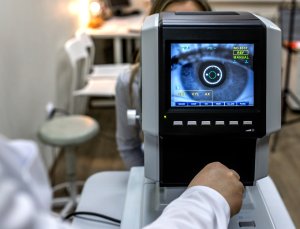Glaucoma Surgery Lebanon, PA

Voted Best of Berks—
eight years in a row!
If you live or work in Lebanon, PA and believe you may have glaucoma, the best way to detect the disease and slow its progression is to get tested and discuss the treatment and surgery options with the board certified, fellowship trained glaucoma specialists at Eye Consultants of Pennsylvania
We are the leading ophthalmology practice in Berks, Lancaster, Lebanon, Montgomery and Schuylkill counties, and have five convenient locations in Wyomissing, Pottsville, Pottstown, Lebanon and Blandon.
As the leading ophthalmology practice in the region, our board certified, fellowship trained ophthalmologists have vast experience in all current glaucoma treatments and surgical procedures. The highly skilled team includes:
- Mehul H. Negarsheth, MD, who completed his glaucoma fellowship at Tufts New England Eye Center and Ophthalmic Consultants of Boston
- Abhishek K. Nemani, MD, who completed his glaucoma fellowship at the prestigious Scheie Eye Institute at the University of Pennsylvania
What is Glaucoma?
The eyes are nourished by a clear fluid (called aqueous humor) that circulates inside and is constantly returned to the blood stream by what is called the trabecular meshwork, or the eye’s drainage canals. The ongoing production, circulation and drainage of this fluid are required in order to maintain healthy eyes.
When something goes wrong with the drainage canal and the fluid is unable to leave the eye as fast as it is produced, pressure inside the eye begins to build. This excess pressure pushes against the delicate optic nerve. If the pressure stays too high for too long, permanent vision loss can occur. This is glaucoma.
Interesting Glaucoma Facts
- Everyone is at risk for glaucoma, from babies to senior citizens.
- Damage from glaucoma is not reversible, and there is no cure. With prompt treatment and/or surgery, however, it is possible to prevent further vision loss.
- Glaucoma is responsible for 9% to 12% of all cases of irreversible blindness in the U.S. and is the second leading cause of blindness worldwide (after cataracts).
- More than 3 million Americans (and 60 million worldwide) are estimated to have glaucoma, but only half of them know they have it.
- 90% to 95% of Americans are affected by open-angle glaucoma, the most common form of the disease.
- In the U.S., open-angle glaucoma strikes African Americans (especially those over 40 years of age) and Hispanics (especially those over 60 years of age) at higher rates than Caucasians and other ethnic groups.
- Glaucoma is 15 times more likely to cause blindness in African Americans than in Caucasians.
- People of Asian ethnicity are more likely to suffer from the rarer form of glaucoma, called closed-angle glaucoma.
- Other high-risk groups include people over the age of 60, individuals with thin cornea, family members of people with glaucoma, diabetics, and people who are severely myopic (nearsighted).
- A dilated eye exam is the best and most effective way to detect glaucoma.
Glaucoma can cause irreversible damage to the optic nerve if left undetected and untreated. If you are in the Lebanon, PA area and need information about treatment or surgery, get in touch with Eye Consultants of Pennsylvania for an evaluation. If detected early, there are many treatment options that can minimize loss of vision before the disease becomes too advanced.
Find a Doctor
Physician information including education, training, practice location and more.
Schedule an Appointment
Call 800-762-7132 or make an appointment online.





